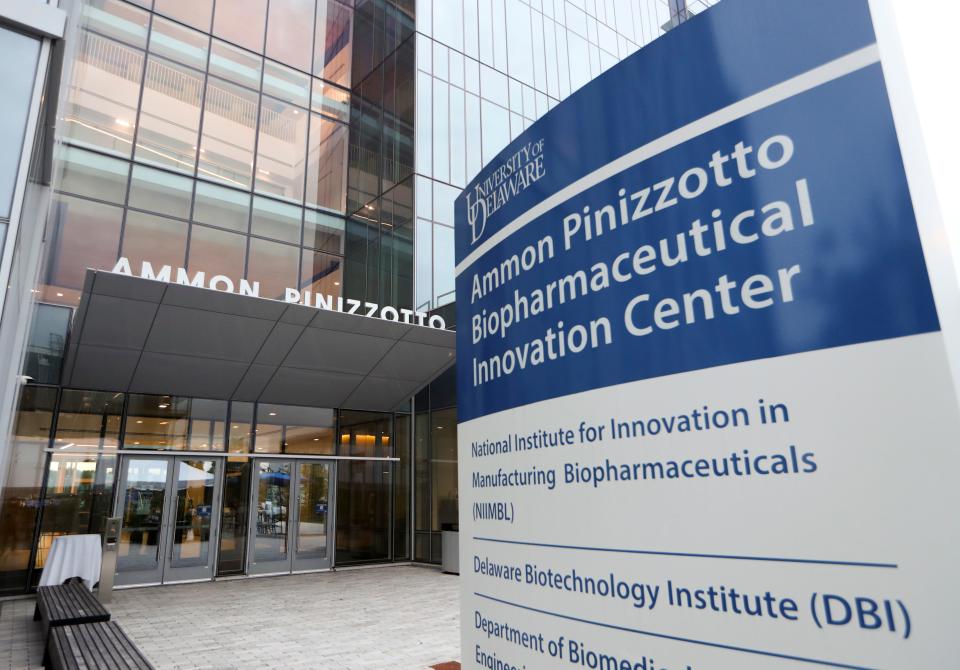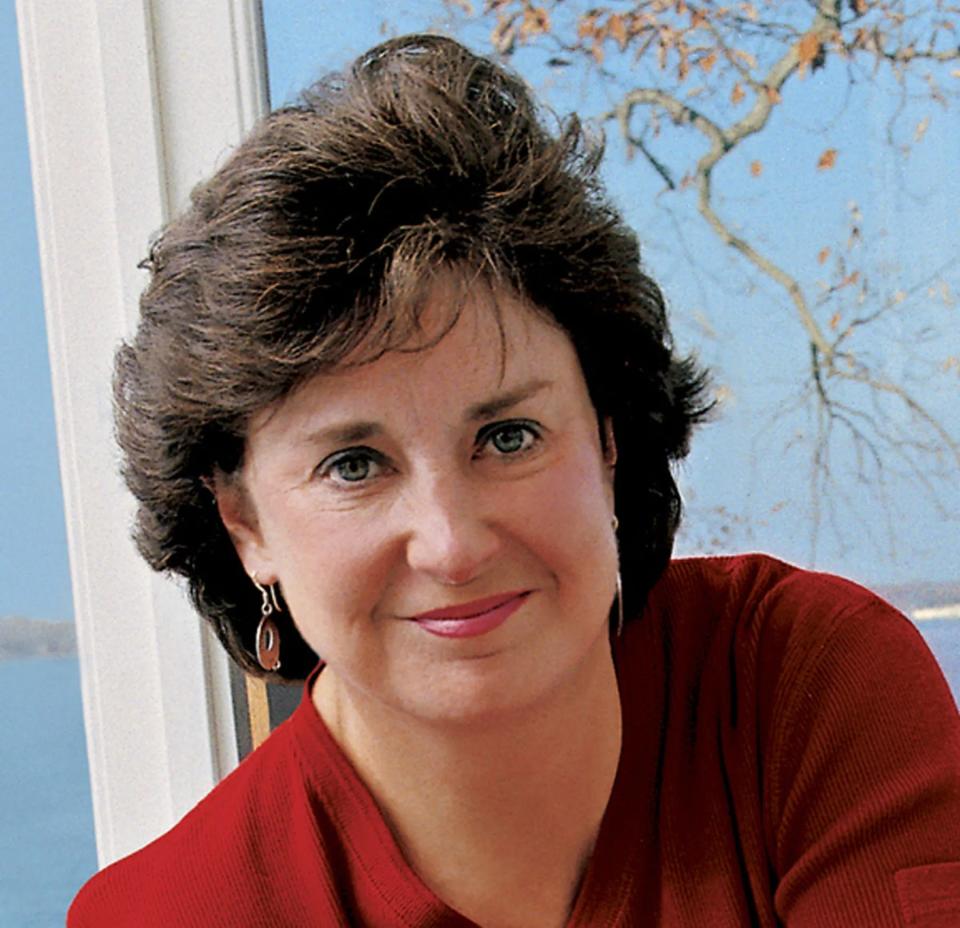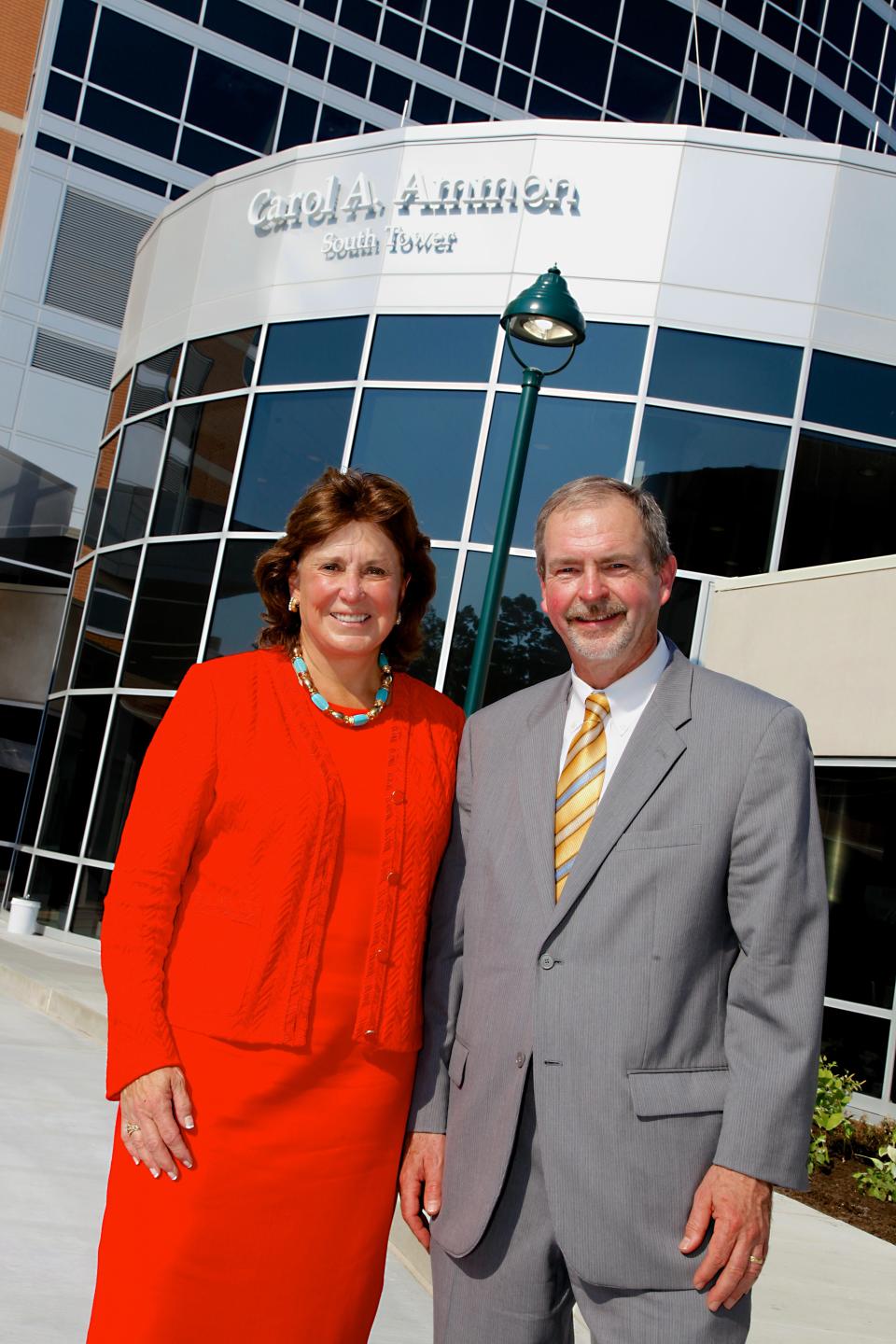How this Delaware woman made her fortune off opioids
They hosted the ribbon-cutting ceremony on a cloudy Thursday in October.
It was a grand opening years in the making. The pandemic had put a hold on any festivities; but in 2021, as the University of Delaware moved to “return to normalcy,” the massive biopharmaceutical building could finally celebrate its opening — and its namesakes.
Carol Ammon and her partner, Marie Pinizzotto, stood alongside acclaimed researchers, faculty and legislators. Together, they took scissors to the blue ribbon underneath the awning that came to bear their names to the tune of $25 million.
Speeches were given, cameras were flashed and handshakes — or, as Ammon came to value, socially distant fist bumps — were exchanged. Anyone who missed the ceremony didn’t need to worry; a large oil painting of Ammon, Pinizzotto and their dogs hung prominently in the building’s lobby.

The celebration; UD’s rising status in the research world; the shiny new laboratories — all of it felt like a new beginning, thanks to Ammon.
But for Nichole Brzozowski, sitting alone in a cheap Wilmington motel room with nothing save for a bag of popcorn, it felt much more like the end. She’d only have a roof over her head for two more nights, and then, she’d be back out on the streets. Opioids had taken everything from her.

Yet for as big and all-consuming as her addiction felt, she could trace it all back to one simple prescription pill: Percocet — the same drug that Ammon built her fortune on.
Although Endo Pharmaceuticals — the company behind Percocet formerly run by Ammon — has been involved in major lawsuits over its “misleading” marketing of opioids, its name has stayed relatively under the public radar.
Staying out of the public eye has always been Endo’s secret weapon, though. While OxyContin manufacturer Purdue Pharma and its founders, the Sackler family, were dragged to court and exposed in the media, records show Ammon pushed her company to silently take over the mantle.
And then, as the people whose lives were taken or changed forever by Endo’s drugs were left to suffer, Ammon set her sights on a new career: philanthropy.
Ammon declined to be interviewed for this story, commenting only that she valued supporting science and healthcare in her philanthropy and career. She did not respond to phone calls, emails or a mailed letter, and only acknowledged requests for comment when approached in person.
She left Endo in 2007 because her name “had gotten a lot of press,” she explained in a University of Delaware interview in 2021. Ammon had stepped down from CEO to chair three years prior and started a tax-exempt foundation in her name. She was the sole president and contributor.
In 2006, tax returns show Ammon’s private foundation gave $25,000 to the National Pain Foundation, one of multiple organizations funded by opioid manufacturers to sway the medical community’s perception of painkillers.
Her foundation also gave $35,650 to the Delaware addiction treatment non-profit SOAR Inc. between 2007 and 2010. The foundation’s public tax returns do not show any donations to organizations fighting the opioid crisis in the years since then.
After giving her partner and former head of Endo’s drug safety Marie Pinizzotto the role — and associated salary — of director in 2008, regular investments in stocks and hedge funds grew the foundation’s available money exponentially. By the end of 2019 — the last year of tax returns available — the foundation’s assets had reached over $21 million.
In Ammon’s interview with the University of Delaware, she said everyone at Endo “had a passion for helping people that were in pain.”
She cited this desire for helpfulness as the reasoning behind her large donations to hospitals and universities over the years.
But in an interview 10 years earlier in the alumni magazine published by Central Connecticut State University — whose liberal arts college bears Ammon’s name — Ammon said she donates to “‘maximize and leverage’ the majority of her wealth.”
Regardless of how noble one’s intentions may be, cultural sociologist Michael Moody, who serves as the Frey Foundation chair for family philanthropy at Grand Valley State University’s Dorothy A. Johnson Center, said there’s always a hint of self-interest involved in philanthropy.
Whether that’s a desire for the fuzzy feeling one gets from doing a good deed or to distance oneself from previous “dirty” actions depends on the case, Moody said. Oftentimes, it’s a combination of both.
What’s in a name?
“Naming is not the be-all and end-all of the ethical decision, but it does make it a different kind of conversation,” Moody said, “by the nature of that endorsement of that donor and a tacit connection between that donor and that institution.”
It’s like a version of money laundering, Moody explained: “Give us your money, and we will wash it clean.”
In Ammon’s case, her large donations to universities have earned her multiple naming rights. At Jefferson University, it’s her name on the alumni building. At Central Connecticut State University, the school’s entire liberal arts college was named after her following an $8 million donation in 2010.
Most of these massive donations came from Ammon’s personal wallet rather than the foundation, meaning they aren’t listed on the foundation’s tax returns. Moody said this isn’t uncommon for wealthy donors, and can be for a variety of reasons.
Philanthropy and naming rights is also a way for the ultra-wealthy to “show belonging and acquire cultural capital or status,” according to Loyola University sociology professor Emily Barman.
Barman, who also serves as the graduate school dean and vice provost of graduate education at the university, has spent years researching the motivations and “social bases” of philanthropy.
She explained that “there's some kind of cultural understanding going on right now that to be legitimately wealthy means you also have to legitimately give away some of your wealth.”
It’s also important for fitting in with other people of similar social and monetary statuses.
Where have I seen that name before?
Carol Ammon’s name is not difficult to find in the Delaware area.
Walking around the University of Delaware’s Science, Technology and Advanced Research (STAR) Campus in Newark, it’s impossible to miss her name on the sign outside the shiny new biopharmaceutical building. At ChristianaCare’s Wilmington Hospital, a portrait of Ammon greets visitors as they enter the southern tower that bears her name.
Her name appears again in Philadelphia on Jefferson University’s alumni building, and another time at Central Connecticut State University’s college of liberal arts.

Of the institutions that responded to requests for comment, spokespeople held nothing back as they sang Ammon’s praises.
She exemplified “extraordinary generosity,” a spokesperson for Central Connecticut State University said.
According to the University of Delaware, Ammon showed “steadfast commitment to advancing science and research to drive innovation and positive impact.”
And at ChristianaCare, she showed a “historic commitment to the health of the greater Wilmington community.”
But as eager as these institutions were to praise Ammon, they were even quicker to clamp down on any criticism of Ammon’s role in the opioid crisis.
When asked whether continuing to display Ammon’s name on a tower condoned her role in the opioid crisis — especially after Endo was involved in massive settlements — ChristianaCare spokesperson Hiran Ratnayake responded: “we do not speculate on ‘potential criticisms.’”
The criticisms weren’t potential, though. Brzozowski, whose life had been upended by Endo’s painkillers, said that “if people knew exactly who (Ammon) was, it wouldn't be okay. And it shouldn’t be okay.”
Even after being told that these criticisms of Ammon’s name being displayed were not potential, Ratnayake repeated his previous statement.
Dia Williams Adams, vice president of philanthropy at ChristianaCare, said in a written statement that the hospital system “review(s) each donation to ensure that it is aligned with (their) policies, values and mission of service.”
“Our patients and community expect us to maintain a high ethical standard in every aspect of our operations, and that includes philanthropy,” Williams Adams said.
ChristianaCare has refused some donations in the past that are “inconsistent” with the hospital’s values, according to Ratnayake. He would not provide any examples of rejected donations.
Ammon’s actions — including her role in the opioid crisis — apparently met the hospital’s standards.
Making her mark at the University of Delaware
A University of Delaware spokesperson also refused to directly discuss Ammon’s donations and opioids, instead repeating that their statement about Ammon’s generosity “speaks for itself.”
The university has a history of accepting contributions from key players in the opioid crisis.
In years prior, the University of Delaware received over $500,000 in donations from La Fondation Sackler, the Canadian offshoot of the family behind Oxycontin’s charity.
Jim Dicker, vice president for development and alumni relations at UD, differentiated the university’s accepted donations from the Sacklers from those of other universities and museums — many of which have publicly sworn the family off — by saying the money went directly toward research at UD, rather than putting “a splashy name on a fancy area in a building.”
Delaware residents can dial 2-1-1 to access a network of free and confidential assistance. Delaware 2-1-1 offers free counseling, treatment programs, free information on mental health and substance abuse, as well as legal services and more.
The National Rehab Hotline can be reached at 1-866-210-1303. You'll be connected with an accredited specialist who can help you through a substance abuse or mental health crisis. The call is free and confidential.
But it’s Ammon’s name — as well as her partner’s — that adorns the university’s new biopharmaceutical building. The university declined multiple opportunities to provide any new context to the previous statement.
Together, Ammon and Pinizzotto contributed $25 million — the largest gift in the university’s history.
Ammon also serves as a trustee at the University of Delaware. According to the school’s charter, trustees “have the entire control and management of the affairs of the University.” They are also in charge of planning and creating contracts for the construction of new buildings on campus.
Ammon was appointed by the existing board of trustees in 2013 and re-elected for a second six-year term in 2019.
At the semi-annual Board of Trustees meeting on Dec. 6, UD President Dennis Assanis gave two direct nods to Ammon, thanking her for her funding of the biopharmaceutical building. She is only the second trustee in the university’s 279-year history to have a campus building named after her while actively serving on the board, and the only one whose naming right came from a board resolution.
When asked about the motivation behind her philanthropy after the December meeting, Ammon said she “really value(s) the advancement of science and innovation in healthcare to really help people.”
“I’ve enjoyed that over my career and done it to the highest ethical standards,” Ammon said. “It’s been a pleasure for me to be able to give back to the community.”
A UD spokesperson immediately interrupted as soon as a question was asked about Endo. Ammon would not answer anything else, simply stating: “That’s my comment, that’s what I can share right now and I need to get to board business.”
She also said she would not be available for comment in the future, as she’s “pretty busy.”
Central Connecticut State University did not respond to direct questions about Ammon’s involvement in the opioid crisis, and Jefferson University did not reply to multiple requests for comment.
Ammon actually discussed her pharmaceutical career in her thesis for her doctor of nursing degree at Jefferson University in 2021, which was titled “Spirituality and Opioid Addiction Recovery.” In her introduction, Ammon wrote that she “has been particularly concerned about the impact on people and society from the non-medical use of opioids.”
She emphasized that she was only involved in developing and selling opioids for “medical use,” making no mention of the fact that many people with substance use disorder began with the over-prescription of painkillers that were pushed in the medical field.
The thesis contained no other mentions of Ammon’s role or work in the pharmaceutical industry.
Dealing with the consequences
Six months after Ammon posed for photos at the opening of her newly named building in 2021 at the university she helps run, Nichole Brzozowski entered a treatment program in California.
“I let go of my ego and my pride and just said, ‘my kids and my family deserve better. I deserve better, and I'm going to get better,’” she said. “And that's what I'm doing.”
For many people living with addiction, recovery is a constant battle. Brittnay Setting said she’s been in and out of inpatient treatment 13 times and gone through 25 detoxes. It wasn’t until she entered a court-ordered Mommy and Me program in Newark, Delaware, that sobriety truly became a reality for her.
She was pregnant at the time, and the program gave her the support she needed to give birth to her child safely and stay sober.
“I completely rebuilt my life from scratch,” she said.
Setting’s work at Net Kirkwood Detox brings her face-to-face with many people in the same place that she once was. And most of their addictions started with prescription pills.
“I know what it's like to be in a position of existence, not living — not so much wanting to die but not knowing how to change anything,” she said. “But the help is there.”
For Setting, Myers and Brzozowski, opioid addiction is just part of the larger story of their lives. For others like Shannon Brady, who lost the father of her children and her best friend, it’s the cause of a gaping hole.
You won't find the names of those destroyed by addiction displayed on buildings or signed on million-dollar checks.
You'll find them etched on gravestones. Or in a list on a friend’s phone — another, and another, and another.
It's up to those left behind to make sure their names matter, too.
This article originally appeared on USA TODAY: How this Delaware woman made her fortune off opioids

 Yahoo Movies
Yahoo Movies 
